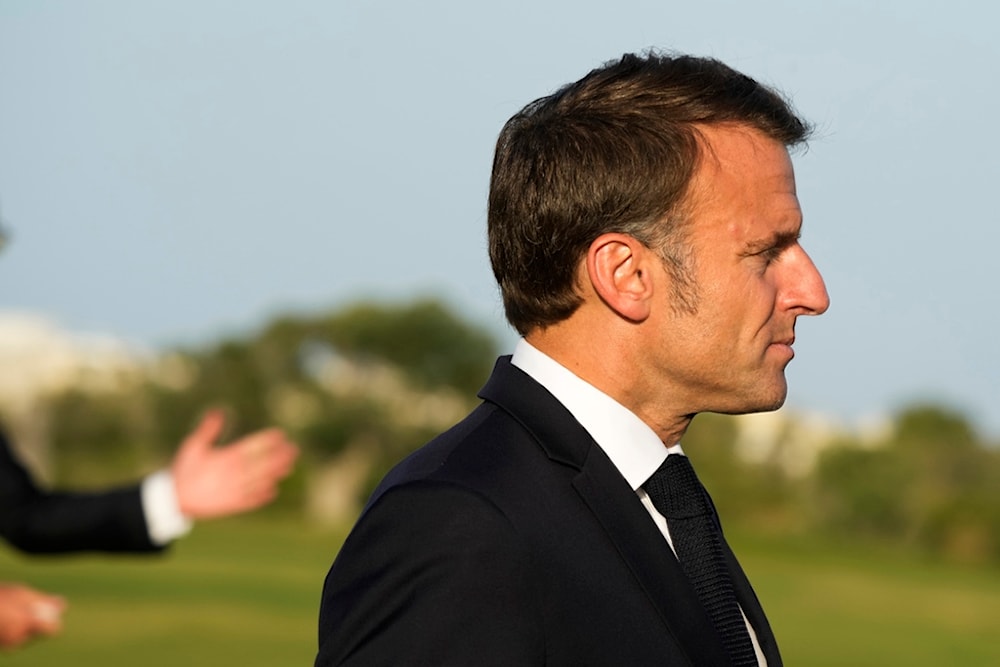Macron's snap elections could backfire against his alliance: FT
Studies have found that France's snap elections could be a race between the left and right wings, squeezing Macron's centrist alliance out.
-

French President Emmanuel Macron arrives to talk to journalists after watching a skydiving demo during the G7 world leaders summit at Borgo Egnazia, Italy, Thursday, June 13, 2024. (AP)
French President Emmanuel Macron risks the expungement of his centrist alliance during snap elections amid the unification of France's left-wing parties.
In response to the resounding victory of right-wing parties in the EU elections, Macron announced on Sunday his decision to dissolve parliament and called for snap legislative elections.
He characterized the outcome of the EU elections as unfavorable for parties advocating for Europe, acknowledging that right-wing parties secured nearly 40% of the vote in France.
"Far-right parties... are progressing everywhere in the continent. It is a situation to which I cannot resign myself," he said.
"I decided to give you the choice... Therefore I will dissolve the National Assembly tonight."
"This decision is serious and heavy but it is an act of confidence. Confidence in you, dear compatriots, and in the capacity of the French people to make the best choice for itself and future generations," he added.
However, according to the Financial Times, the president's venture could backfireو as projections suggest that only 40 of his alliance's members of parliament could qualify during the second round of elections on July 7.
Two studies for Le Figaro and BFM TV found that the electoral race would majorly be fought by left-wing and right-wing candidates. It was also highlighted that both election rounds on June 30 and July 7, will be predominantly determined by the French Left.
This came in light of the unity pact struck by four typically contentious left-wing parties, which included a deal on candidates and a joint program, and was endorsed by former socialist president François Hollande.
Although no candidate for the Prime Minister was introduced by the alliance, Jean-Luc Mélenchon, leader of the far-left France Insoumise (France Unbowed, LFI) party, which secured the largest share of candidates on the joint list with the center-left, Socialists, Greens, and Communists, nudged that he could take on the part.
What are forecasts saying?
Had the left parties run multiple candidates for each seat, Macron’s centrist alliance would have had a better chance of advancing to the second round. To qualify for a run-off, a candidate needs the support of 12.5 percent of registered voters.
Le Figaro’s calculations, derived from last week’s European parliamentary election results to the upcoming first round of the French legislative poll, suggest that the right-wing National Rally (RN) would lead with 362 seats and the left would lead with 211.
However, some analysts warned against referring to the European Parliament elections, which are held in a single round under proportional representation, often have low turnout, and often signify a protest vote against the government.
Mathieu Gallard, a pollster at Ipsos, remarked that forecasted seat distribution at this phase is “just a matter of intuition,” noting that candidates have not been selected and finalized and that incumbent MPs often enjoy significant local support. Additionally, the margins of error, close races, and uncertainties about turnout make the outcome very ambiguous at this stage.
Nevertheless, besides the forecasts, a series of pessimistic surveys suggested that Macron's alliance could lose at least half of its 250 seats in parliament.
Responding to the projected figures, however, an advisor to Macron’s alliance said, "There is a narrow path forward, and we’ll see how dynamics shift in the coming days. It is hard but not impossible."
An Elabe poll for BFM and La Tribune Dimanche shows the following support: RN at 31%, 4% of which is attributed to the rival far-right party Reconquête [220-270 seats], the left-wing alliance at 28% [150-190 seats], Macron’s centrist alliance at 18% [90-130 seats], and the center-right Les Républicains at 6.5% [30-40 seats].
The advisor noted that the 18 percent for Macron’s alliance indicated new momentum after the European vote on Sunday, in which they scored 15 percent. The advisor also mentioned polling showing that nearly two-thirds of the French public supported Macron’s decision to dissolve parliament.
This week’s opinion polls suggest the most likely outcome is a hung parliament. However, if RN wins by a large margin, they could claim the office of prime minister and the right to form a government.

 4 Min Read
4 Min Read








